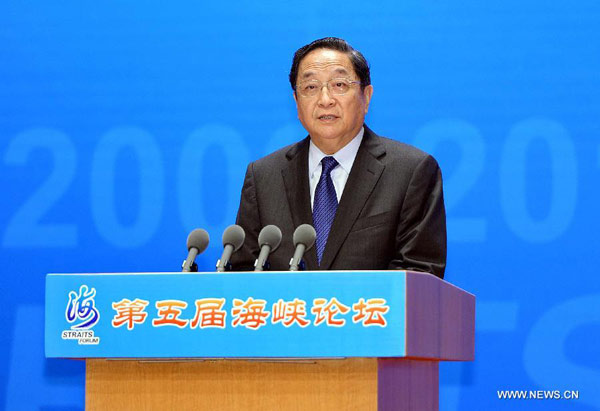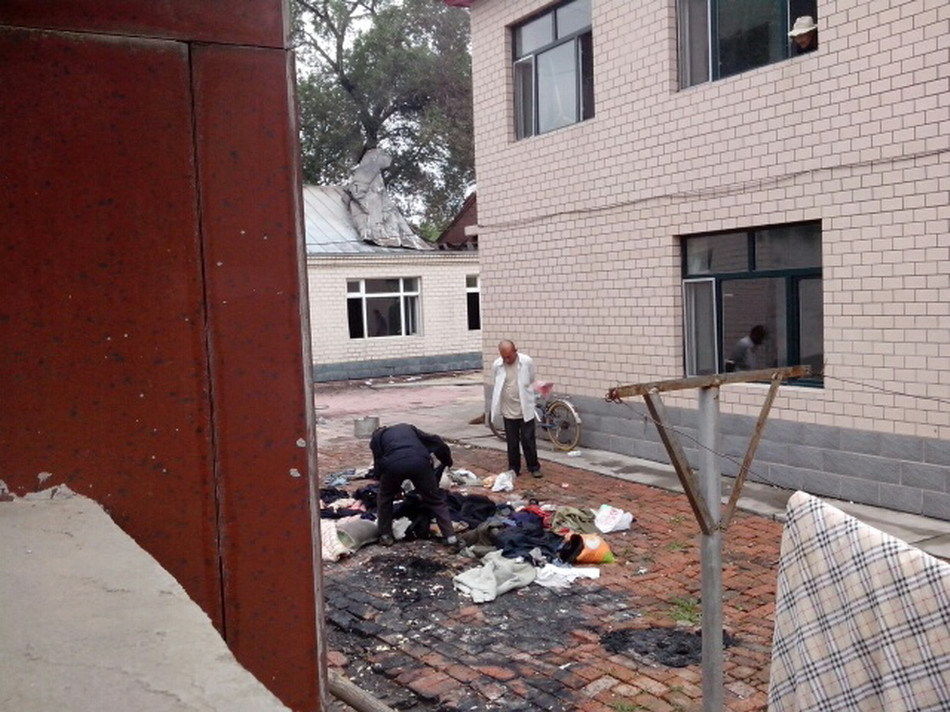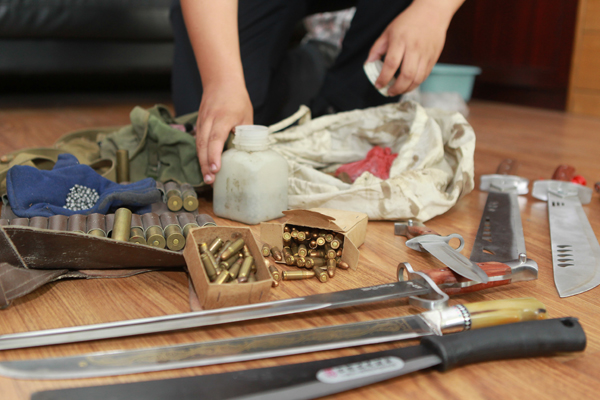The Chinese mainland on Sunday announced a total of 31 policies in the areas of legal rights, education, culture, tourism and other aspects of economic and social life to further boost cross-Strait ties, during the fifth Straits Forum in southeast China’s Xiamen City.
 |
|
Yu Zhengsheng, member of the Standing Committee of the Political Bureau of the Communist Party of China (CPC) Central Committee and chairman of the National Committee of the Chinese People’s Political Consultative Conference, addresses the conference of the 5th Straits Forum in Xiamen of southeast China’s Fujian Province, June 16, 2013.[Photo/Xinhua]
|
The Supreme People’s Court will unveil judicial interpretation for recognizing and implementing the paper of civil mediation followed by Taiwan authorities at village, township and city levels, announced Zhang Zhijun, director of the Taiwan Affairs Office of the State Council.
To offer more convenience for Taiwanese visitors, an additional 11 provincial entry-exit administrative departments on the mainland will accept applications from Taiwanese compatriots who reside on the mainland for renewal of their entry permits, Zhang added.
Nine such departments already offered the service.
The mainland will also open 10 more categories of professional qualification examinations to Taiwan residents, support Taiwanese graduates from mainland colleges to start their own businesses, and provide subsidies for entrepreneurship training to students from Taiwan.
According to Zhang, 10 cultural exchanges bases will be set up on the mainland in Henan, Fujian and Beijing.
He said that another 11 historical sites will also play the role of cross-Strait communication bases, including the Confucius Temple in east China’s Shandong Province, and some revolutionary relic sites in central Hubei Province and southwest Chongqing Municipality.
The official, who did not specify when any of these new policies would take effect, added that a cross-Strait copyright trade center as well as a digital publication base working across the Strait will be established in Fujian.
In order to boost cross-Strait tourism, residents of 13 more mainland cities will be eligible to visit Taiwan as individual tourists under a new cross-Strait agreement, according to Shao Qiwei, head of the National Tourism Administration.
The 13 cities, including Shenyang, Zhengzhou, Wuhan, Suzhou, Ningbo, Qingdao, Shijiazhuang, Changchun, Hefei, Changsha, Nanning, Kunming and Quanzhou, will extend the list of such mainland cities to 26.
The fifth Straits Forum opened on Sunday and is scheduled to wrap up on June 21 in Xiamen, a port city at the western side of Taiwan Strait.
It features an array of activities on grassroots exchanges between Taiwan and the mainland, including a main conference in Xiamen as well as sub-forums and seminars in cities across the province.
Mainland-Taiwan relations entered a tense era after the Kuomintang (KMT) lost a civil war with the Communist Party of China and fled to Taiwan in the late 1940s.
But relations between the two warmed up after the KMT, led by a new generation of leaders, returned to power in the 2008 Taiwan election, ending eight years of rule by the pro-independence Democratic Progressive Party.
SOURCE OF EXCITEMENT
The preferential policies announced on Sunday have drawn wide attentions from both sides of the strait.
Many delegates from Taiwan said the decision to allow residents in 13 mainland cities to apply for individual tourism to Taiwan would send ripples of excitement across the island.
Chang His-tsung, a spokesman for Taiwan tourism authority, called the 13 cities “top choices” in an interview with Xinhua.
The cities are located in different regions of the mainland and the choice fully considered the convenience of cross-Strait flights, Chang said.
Wang Hongyuan, head of China Quanzhou International Techno-Economic Cooperation (group) Taiwan branch, was glad to see Quanzhou on the list as more than seven million Taiwan compatriots have their ancestral homes as well as relatives in the city in Fujian Province.
“I have often been asked when people from Quanzhou could visit Taiwan independently, and now it comes true,” he said.
Syu Kuen-chin, a Taiwan expert on trade and employment market, said the over-crowded job market on the island had prompted many graduates there to consider “going west” and seeking a job on the mainland.
“The mainland’s favorable policy will certainly attract more Taiwanese students to the mainland for education and career,” Syu said.
PEOPLE ORIENTATION
Experts on Taiwan affairs said the latest policy package focuses on improving the wellbeing of ordinary Taiwanese, including those having settled down on the mainland or local Taiwanese who have close ties with the mainland.
“The most salient feature of this year’s preferential policies is touching down to the grassroots and focusing on the livelihood issues,” said Zhang Wensheng, professor at the Taiwan Research Institute of Xiamen University.
Zhang praised the policies of being “subtle and considerate” and comprehensive, covering areas from educational cooperation to copyright trading to direct flights.
“The new policies will make cross-Strait communication more convenient and promote cultural integration, reflecting the people-orientated mentality of the cross-Strait exchanges,” he said.
The latest policy package add to the total 124 such Taiwan-friendly policies released at the Straits Forum since it was initiated in 2008 as a major platform to further grassroots exchanges between the mainland and Taiwan.
As direct beneficiaries of the improving mainland-Taiwan relations, the ordinary Taiwanese are becoming supporters of this trend, according to Zhang.
“Taiwanese at the grassroots level are realizing their interests are closely tied to the cross-Strait relations and thus becoming the social foundation of the cross-Strait peaceful development,” Zhang said.
![Man detained for unhooking bra of woman in subway.[Photo/weibo.com] Man detained for unhooking bra of woman in subway.[Photo/weibo.com]](http://images.china.cn/attachement/jpg/site1007/20130801/7427ea210acc1363f90404.jpg)
![]()

![A house is damaged in quake-affected Lixian County, northwest China's Gansu Province, July 22, 2013. A 6.6-magnitude earthquake jolted a juncture region of Minxian County and Zhangxian County in Dingxi City of the province Monday morning. Lixian County is about 180 kilometers away from Minxian County. [Li Yaoqin/Xinhua] A house is damaged in quake-affected Lixian County, northwest China's Gansu Province, July 22, 2013. A 6.6-magnitude earthquake jolted a juncture region of Minxian County and Zhangxian County in Dingxi City of the province Monday morning. Lixian County is about 180 kilometers away from Minxian County. [Li Yaoqin/Xinhua]](http://images.china.cn/attachement/jpg/site1007/20130723/001ec949ff5c1358097b02.jpg)

![Li Tianyi(L) and his father Li Shuangjiang.[File photo] Li Tianyi(L) and his father Li Shuangjiang.[File photo]](http://images.china.cn/attachement/jpg/site1007/20130712/7427ea210acc1349953401.jpg)
